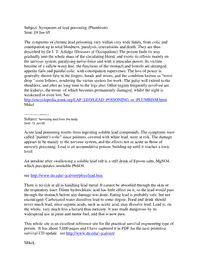
Symptoms And Cure Of Lead Poisoning 2005 PDF
Preview Symptoms And Cure Of Lead Poisoning 2005
Subject: Symptoms of lead poisoning (Plumbism) Sent: 19 Jun 05 The symptoms of chronic lead poisoning vary within very wide limits, from colic and constipation up to total blindness, paralysis, convulsions and death. They are thus described by Dr J. T. Arlidge (Diseases of Occupations) The poison finds its way gradually into the whole mass of the circulating blood, and exerts its effects mainly on the nervous system, paralysing nerve-force and with it muscular power. Its victims become of a sallow-waxy hue; the functions of the stomach and bowels are deranged, appetite fails and painful colic .with constipation supervenes. The loss of power is generally shown first in the fingers, hands and wrists, and the condition known as “wrist- drop “ soon follows, rendering the victim useless for work. The palsy will extend to the shoulders, and after no long time to the legs also. Other organs frequently involved are the kidneys, the tissue of which becomes permanently damaged; whilst the sight is weakened or even lost. See http://encyclopedia.jrank.org/LAP_LEO/LEAD_POISONING_or_PLUMBISM.html Mikel ------------------ Subject: Removing lead from the body Sent: 12 Jun 05 Acute lead poisoning results from ingesting soluble lead compounds. The symptoms were called "painter's colic" since painters, covered with white lead, were at risk. The damage appears to be mainly to the nervous system, and the effects not as acute as those of mercury poisoning. Lead is an accumulative poison, building up until it reaches a toxic level. An antidote after swallowing a soluble lead salt is a stiff drink of Epsom salts, MgSO4, which precipitates insoluble PbSO4. see http://www.du.edu/~jcalvert/phys/lead.htm There is no risk at all in handling lead metal. It cannot be absorbed through the skin or the respiratory tract. Dilute hydrochloric acid has little effect on it, so the lead would pass through the stomach before any damage was done. Eating lead is probably safe, but not encouraged. Carbonated water dissolves lead to some degree. Food and drink should never touch lead, since organic acids, such as acetic acid, may dissolve lead. Lead is, on the whole, very much less a hazard than mercury. It was made dangerous by its widespread use in paint and motor fuel, and that is now past. This whole site is an excellent reference site for the practical survival engineering type of person. It has about 5,000 pages and I have captured it in PDF for the next primitive survival CD update. see http://www.du.edu/~jcalvert/ MikeL
